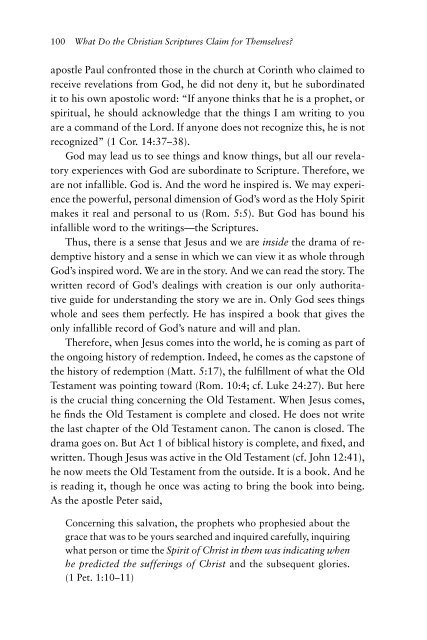Scriptures selfattesting authority question doctrine truthfulness Scriptures
peculiar-glory-en
peculiar-glory-en
You also want an ePaper? Increase the reach of your titles
YUMPU automatically turns print PDFs into web optimized ePapers that Google loves.
100 What Do the Christian <strong>Scriptures</strong> Claim for Themselves?<br />
apostle Paul confronted those in the church at Corinth who claimed to<br />
receive revelations from God, he did not deny it, but he subordinated<br />
it to his own apostolic word: “If anyone thinks that he is a prophet, or<br />
spiritual, he should acknowledge that the things I am writing to you<br />
are a command of the Lord. If anyone does not recognize this, he is not<br />
recognized” (1 Cor. 14:37–38).<br />
God may lead us to see things and know things, but all our revelatory<br />
experiences with God are subordinate to Scripture. Therefore, we<br />
are not infallible. God is. And the word he inspired is. We may experience<br />
the powerful, personal dimension of God’s word as the Holy Spirit<br />
makes it real and personal to us (Rom. 5:5). But God has bound his<br />
infallible word to the writings—the <strong>Scriptures</strong>.<br />
Thus, there is a sense that Jesus and we are inside the drama of redemptive<br />
history and a sense in which we can view it as whole through<br />
God’s inspired word. We are in the story. And we can read the story. The<br />
written record of God’s dealings with creation is our only authoritative<br />
guide for understanding the story we are in. Only God sees things<br />
whole and sees them perfectly. He has inspired a book that gives the<br />
only infallible record of God’s nature and will and plan.<br />
Therefore, when Jesus comes into the world, he is coming as part of<br />
the ongoing history of redemption. Indeed, he comes as the capstone of<br />
the history of redemption (Matt. 5:17), the fulfillment of what the Old<br />
Testament was pointing toward (Rom. 10:4; cf. Luke 24:27). But here<br />
is the crucial thing concerning the Old Testament. When Jesus comes,<br />
he finds the Old Testament is complete and closed. He does not write<br />
the last chapter of the Old Testament canon. The canon is closed. The<br />
drama goes on. But Act 1 of biblical history is complete, and fixed, and<br />
written. Though Jesus was active in the Old Testament (cf. John 12:41),<br />
he now meets the Old Testament from the outside. It is a book. And he<br />
is reading it, though he once was acting to bring the book into being.<br />
As the apostle Peter said,<br />
Concerning this salvation, the prophets who prophesied about the<br />
grace that was to be yours searched and inquired carefully, inquiring<br />
what person or time the Spirit of Christ in them was indicating when<br />
he predicted the sufferings of Christ and the subsequent glories.<br />
(1 Pet. 1:10–11)


